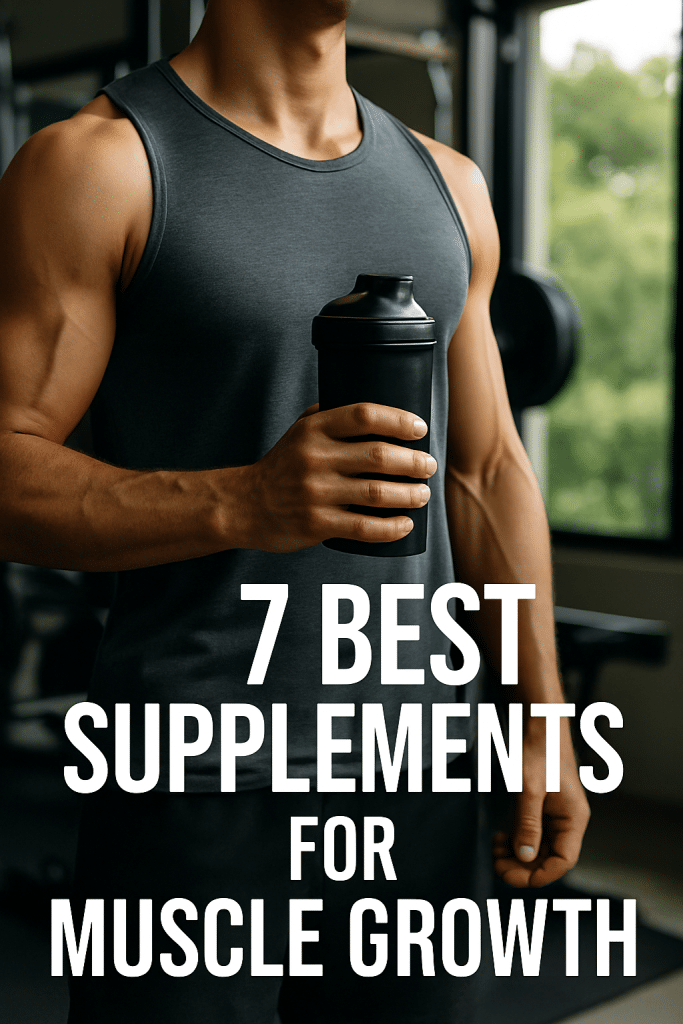Are you a health-conscious adult eager to boost your muscle gains naturally and effectively? You’re in the right place! Navigating the world of supplements can be a bit overwhelming—so many products claim to be the best supplements for muscle growth but not all deliver on their promises. In this in-depth article, I’ll share my firsthand research, expertise, and trusted recommendations to help you choose supplements that genuinely support your muscle growth journey, all while aligning with natural wellness principles.
We’ll cover seven top supplements—from the ever-popular creatine and whey protein to emerging natural enhancers like HMB—explaining how they work, their benefits, ideal dosages, and best ways to incorporate them into your routine. Plus, I’ll answer common questions and provide guidance on combining supplements with proper nutrition and exercise. Ready to power up your muscle game naturally? Let’s dive in!
Understanding Muscle Growth and Supplementation
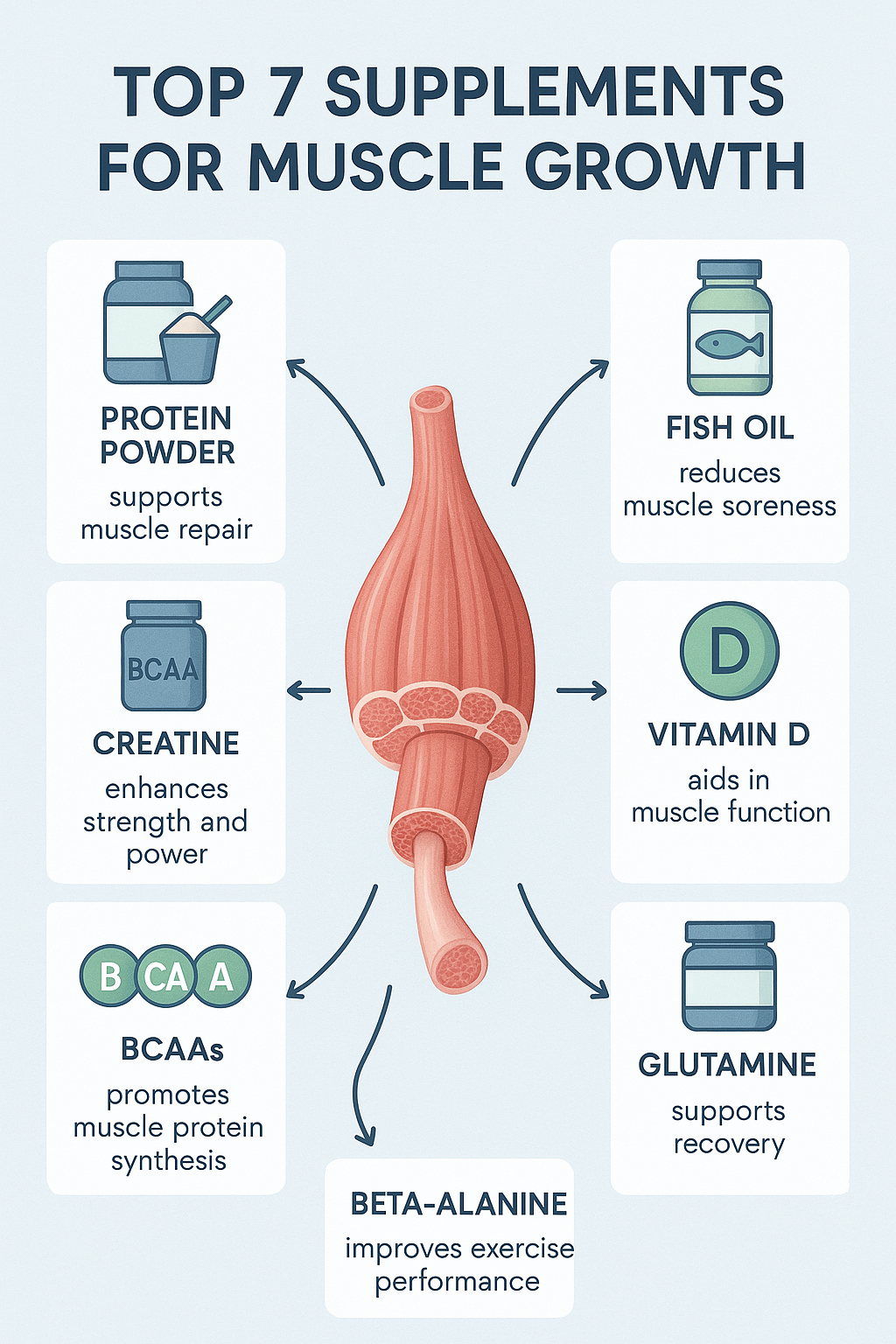
How Muscle Protein Synthesis Works
To appreciate how supplements support muscle growth, it’s crucial to understand muscle protein synthesis (MPS), the biological process where your body builds new muscle proteins. When you engage in strength training or resistance exercises, you create tiny micro-tears in muscle fibers. This damage triggers MPS, where your body repairs and reinforces muscles, leading to hypertrophy—or muscle growth.
MPS depends heavily on the availability of amino acids, especially essential amino acids that your body cannot produce on its own. Without sufficient protein and key nutrients, your muscles can’t repair or grow efficiently. Supplements that boost MPS typically provide concentrated amino acids, support energy metabolism, or optimize recovery—helping you build muscle faster and more sustainably.
Role of Nutrition and Exercise in Muscle Building
Supplements can help, but they’re only part of the equation. You need a solid foundation of balanced nutrition and consistent exercise. Here’s what matters most:
- Nutrition: Adequate protein intake (generally 1.2 to 2.0 grams per kilogram of body weight), complex carbohydrates for energy, healthy fats for hormone regulation, and micronutrients like vitamin D and omega-3s play pivotal roles in muscle growth.
- Exercise: Resistance training or weightlifting stimulates muscle adaptation. Progressive overload—gradually increasing the weight, frequency, or reps—is key to pushing muscle development.
- Rest: Muscles grow during recovery, not while you’re working out. Quality sleep and rest days are essential.
Together with this triad, the best supplements for muscle growth can maximize your results by enhancing MPS, reducing muscle breakdown, speeding recovery, and providing energy.
Key Criteria for Selecting Muscle Growth Supplements
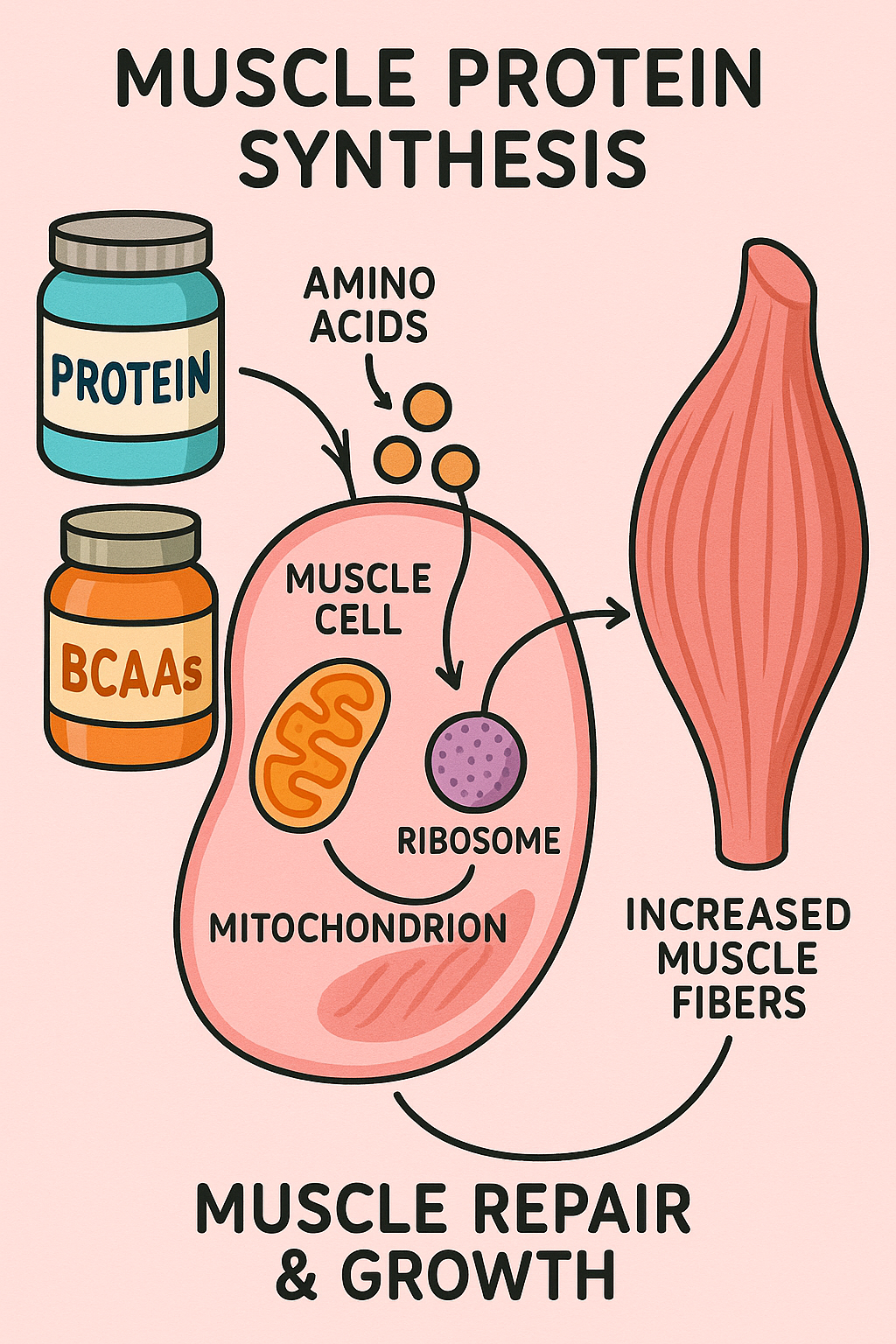
Safety and Natural Ingredients
If you’re health-conscious like me, safety is paramount. Steer clear of steroids or synthetic compounds with adverse side effects. Look instead for:
- Supplements with natural ingredients or compounds well-studied for safety.
- Products tested by third-party laboratories for purity and potency.
- Transparent labels free of artificial additives, fillers, or banned substances.
Natural doesn’t mean ineffective; many natural supplements are clinically shown to aid muscle growth without undue risk.
Scientific Evidence and Effectiveness
I trust supplements backed by robust scientific research. Some compounds repeatedly show benefits in peer-reviewed trials:
- Creatine monohydrate enhances strength and power.
- Whey protein promotes rapid muscle protein synthesis.
- Beta-alanine delays fatigue during intense training.
- Omega-3s reduce inflammation aiding recovery.
Beware of hype or anecdotal claims without solid evidence. Always consult credible sources to differentiate effective supplements from marketing fluff.
Dosage and Timing Considerations
Even the best supplements can be ineffective or harmful if misused. Here’s what to consider:
- Follow recommended dosages validated by clinical studies.
- Take supplements at optimal times—e.g., whey protein immediately post-workout for muscle repair.
- Be aware of potential side effects and adjust accordingly.
- Consider cycling certain supplements to maintain efficacy and reduce tolerance.
Top 7 Best Supplements for Muscle Growth
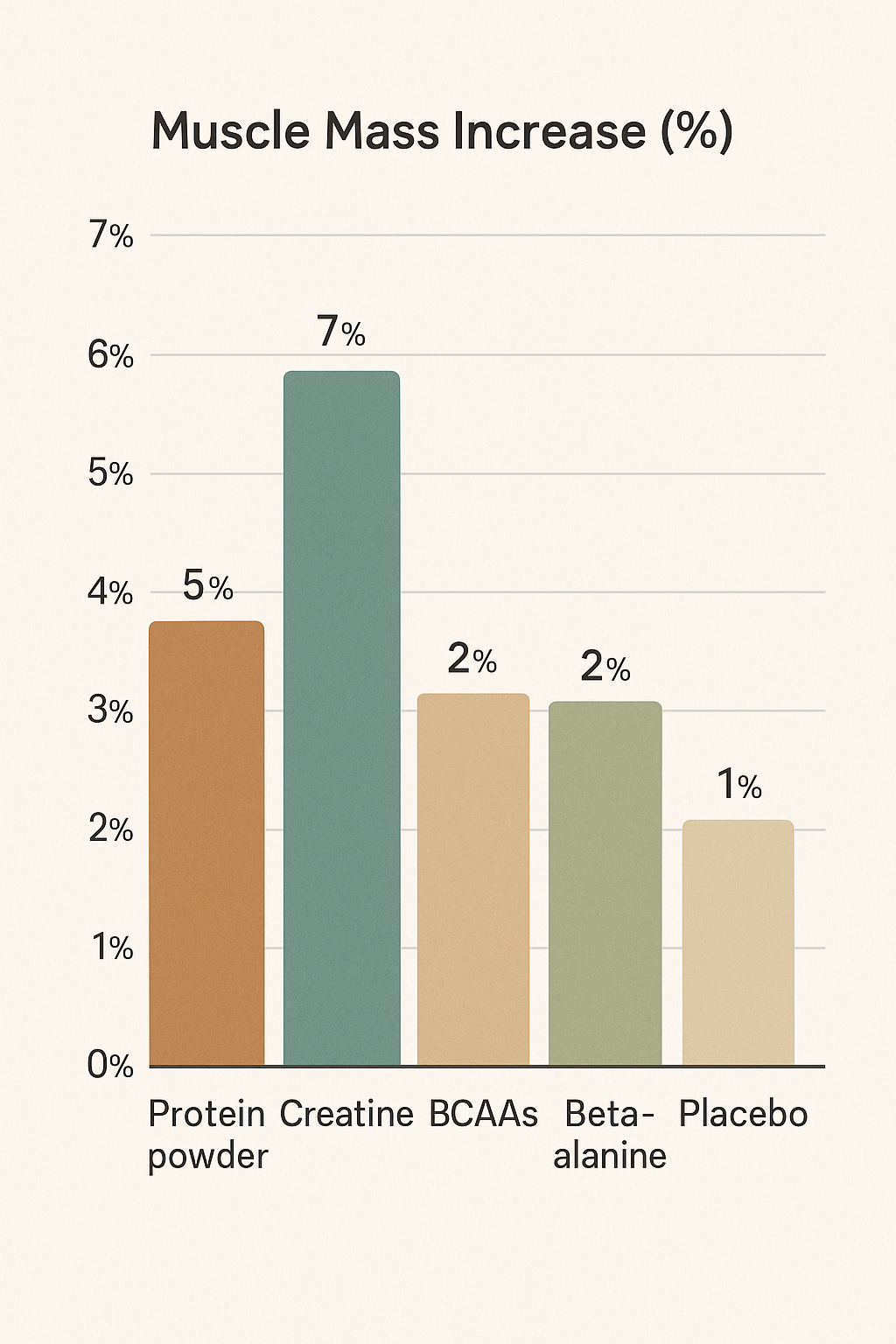
Creatine Monohydrate: Enhancing Strength and Power
Benefits of Creatine for Muscle Performance
Creatine monohydrate is arguably the most studied and effective supplement for muscle growth and strength. It works by increasing the phosphocreatine stores in your muscles, allowing for faster regeneration of ATP (adenosine triphosphate)—the energy currency during high-intensity exercises like weightlifting. This means:
- More reps per set and improved workout intensity.
- Increased muscle volume due to water retention within muscle cells.
- Enhanced recovery and reduced cell damage post-training.
A meta-analysis of over 500 studies confirms creatine boosts muscle mass and strength gains, especially when combined with resistance training.
For a trusted product, I recommend Thorne Creatine. This micronized creatine monohydrate offers superior absorption, is NSF Certified for Sport, and free from artificial additives, making it a safe choice for dedicated athletes. Priced around $19.95 for 100 servings, it’s excellent value.
Recommended Dosage and Usage Guidelines
- Loading phase (optional): 20 grams per day for 5–7 days.
- Maintenance: 3–5 grams daily.
- Best taken with carbohydrates to maximize uptake.
- Hydrate well to reduce potential water retention discomfort.
Whey Protein: Rapid Muscle Protein Synthesis
Whey Protein Isolate vs. Concentrate
Whey protein is a fast-digesting protein source rich in essential amino acids and branched-chain amino acids (BCAAs), crucial for triggering MPS post-workout. Two main types exist:
- Whey Protein Concentrate: Contains 70-80% protein, more fats and lactose, moderate price.
- Whey Protein Isolate: Over 90% protein, lower carbs and fat, ideal for those sensitive to lactose.
If you want a clean protein powder to fuel your muscles quickly, Optimum Nutrition Gold Standard Whey is my top pick. It delivers 24 grams per serving and 5.5 grams of BCAAs. Priced around $40 for a 5-pound container, it’s widely trusted and mixes easily with liquids. Note it contains soy, so avoid if allergic.
Best Timing and Amounts for Muscle Gain
- Consuming 20-40 grams within 30 minutes post-workout maximizes MPS.
- Protein intake should spread evenly throughout the day.
- Combining whey with carbs post-exercise enhances recovery.
Casein Protein: Sustained Muscle Recovery Through the Night
Advantages of Slow-Digesting Protein
Unlike whey, casein digests slowly, steadily supplying amino acids for up to 7 hours. That makes it perfect for overnight recovery when food intake pauses. This slow-release can reduce muscle breakdown, helping maintain a positive muscle protein balance during sleep.
Optimal Use for Preventing Muscle Breakdown
- Consume 20-40 grams 30 minutes before bedtime.
- Mix with water or milk.
- Ideal for individuals seeking to prevent muscle loss during fasting periods.
Many athletes combine whey and casein to balance rapid recovery and prolonged amino acid availability.
Beta-Alanine: Delaying Fatigue to Enhance Endurance
Mechanism and Benefits for High-Intensity Training
Beta-alanine raises muscle carnosine levels, buffering acid buildup during intense exercise. This delays the onset of muscle fatigue so you can push harder and longer in reps or sprints.
Research shows beta-alanine improves performance during activities lasting 1 to 4 minutes, like high-rep resistance training, and supports overall muscle endurance.
Proper Dosage to Maximize Effects
- 2–5 grams daily, split into small doses to minimize tingling sensation (paresthesia).
- Best taken consistently for at least 4 weeks to raise muscle carnosine stores.
Branched-Chain Amino Acids (BCAAs): Supporting Recovery and Muscle Protein Synthesis
Types of BCAAs and Their Role in Muscle Growth
BCAAs—leucine, isoleucine, and valine—play vital roles in initiating muscle protein synthesis, reducing exercise-induced muscle damage, and decreasing soreness.
Leucine is especially critical, acting as the primary trigger for MPS activation.
Ideal Supplementation Strategies
- Typical dosage: 5–10 grams before or during workouts.
- Can be used alongside other protein supplements for enhanced recovery.
- Beneficial during fasted training or when dietary protein is insufficient.
Omega-3 Fatty Acids: Reducing Inflammation and Supporting Muscle Health
Anti-inflammatory Benefits and Muscle Repair Support
Omega-3 fatty acids (EPA and DHA) possess strong anti-inflammatory properties that help reduce muscle soreness and speed recovery. They also aid in muscle protein synthesis via cellular signaling pathways.
A study published in the American Journal of Clinical Nutrition showed omega-3 supplementation improved muscle protein synthesis rates in healthy adults, enhancing lean mass development.
Recommended Intake for Optimal Results
- Aim for 1–3 grams of combined EPA and DHA daily.
- Choose high-quality fish oil or algae-based supplements for purity.
Vitamin D: Enhancing Muscle Function and Strength
Importance of Vitamin D for Muscle Regeneration
Vitamin D receptors in muscle cells regulate muscle contraction, strength, and growth. Deficiency links to increased risk of muscle weakness and injury.
Adequate vitamin D levels improve muscle function, balance, and regeneration.
Assessing Deficiency and Supplementation Guidelines
- Test blood levels to ensure sufficiency (optimal: 30–50 ng/mL).
- Supplement with 1,000–4,000 IU daily if deficient or insufficient.
- Often paired with calcium for bone and muscle health.
Emerging Natural Supplements to Enhance Muscle Growth

HMB (Beta-Hydroxy Beta-Methylbutyrate): Reducing Muscle Damage and Boosting Synthesis
HMB is a metabolite of leucine shown to decrease muscle breakdown and support recovery after intense exercise. It’s especially helpful for beginners or those returning after a layoff.
Transparent Labs Creatine HMB combines 5 grams creatine monohydrate with 1.5 grams HMB, offering a synergistic boost. Available in multiple flavors starting at $1.50 per serving, it enhances strength and preserves muscle mass effectively.
Citrulline and Nitric Oxide Boosters: Improving Blood Flow and Performance
Citrulline increases nitric oxide production, improving nutrient and oxygen delivery to muscles. This can enhance endurance and the “muscle pump” during training.
Common supplemental doses range from 6–8 grams before workouts.
Plant-Based and Vegan Supplements for Muscle Growth
Effective Options for Plant-Based Athletes
Vegan athletes aren’t left behind. Popular options include:
- Pea protein: High in BCAAs, supports MPS.
- Brown rice and hemp protein: Complement pea protein to provide all essential amino acids.
- Spirulina and chlorella: Natural antioxidants aiding recovery.
Combining Plant Proteins and Natural Enhancers
Combining different plant proteins ensures a complete amino acid profile. Supplements like beetroot powder (nitric oxide booster) or ashwagandha (stress modulator) can further support growth naturally.
Combining Supplements with Nutrition and Training for Maximum Muscle Growth
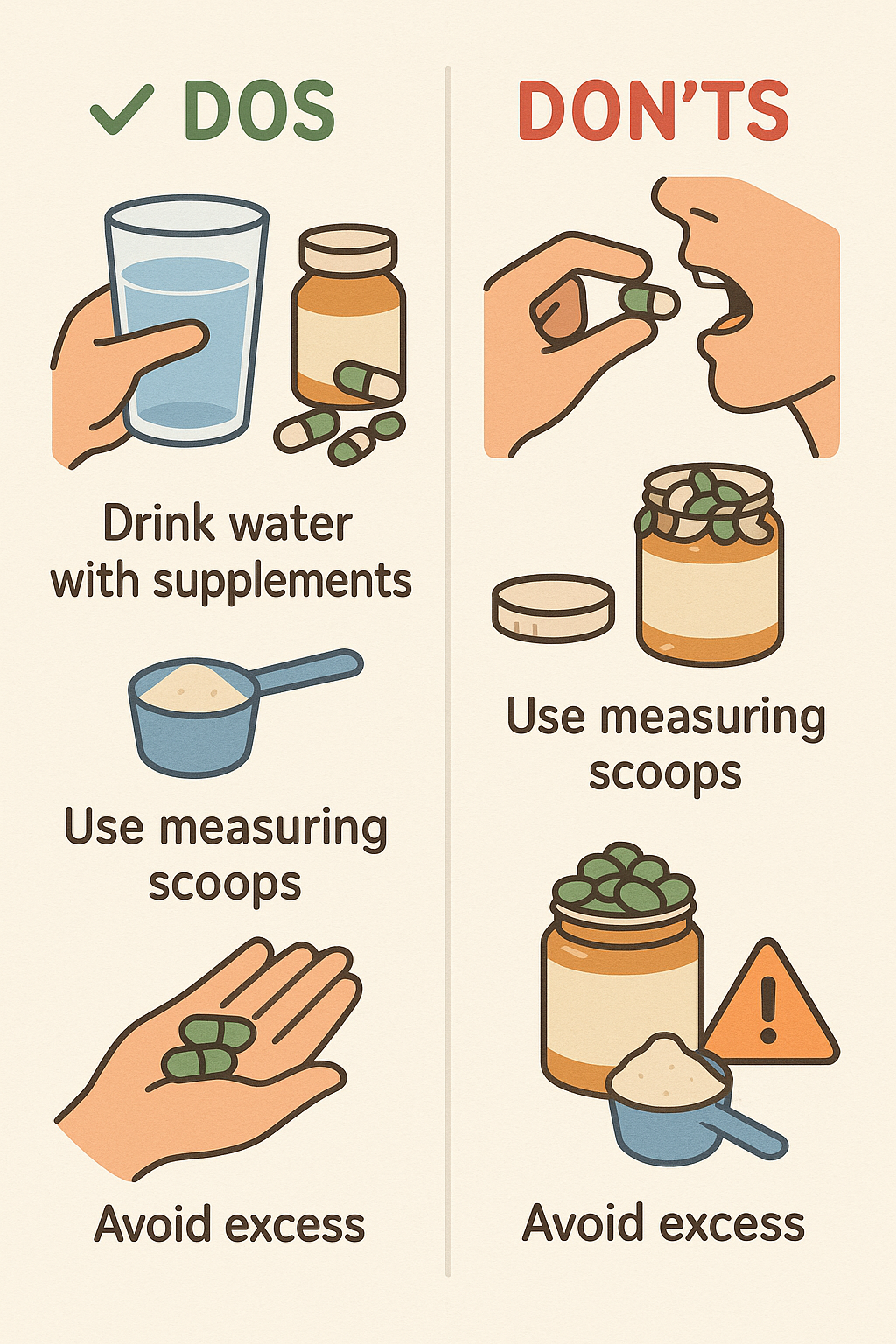
Importance of Balanced Macronutrients and Protein Intake
Supplements don’t replace a balanced diet. For muscle hypertrophy, prioritize:
- Adequate protein (1.2-2.0 g/kg/day).
- Sufficient carbohydrates for energy replenishment.
- Healthy fats for hormonal health.
- Micronutrients from whole foods.
Aligning Supplementation with Workout Timing
Strategically timed supplementation maximizes effectiveness:
- Pre-workout: Beta-alanine, creatine, citrulline.
- Post-workout: Whey protein, BCAAs, creatine.
- Before bed: Casein protein.
- Daily: Omega-3s, vitamin D, HMB.
Safety, Side Effects, and Choosing Quality Supplements
Avoiding Steroids and Unsafe Enhancers
Steer away from anabolic steroids or unregulated “muscle boosters” that pose serious health risks.
How to Identify High-Quality, Natural Supplements
- Look for third-party certifications (e.g., NSF Certified).
- Research and read verified user reviews.
- Opt for brands with transparent ingredient lists.
Monitoring Dosage and Cycling Supplements
Regularly monitor your body’s reactions. Avoid exceeding recommended doses. Some supplements, like creatine, can be cycled—take for 8-12 weeks followed by a break.
Frequently Asked Questions about the Best Supplements for Muscle Growth
Can supplements replace a balanced diet?
Supplements complement but do not replace balanced nutrition. Whole foods provide vitamins, minerals, and fiber essential for overall health and muscle building.
Are these supplements suitable for beginners?
Yes! Supplements like creatine and whey protein are safe and effective for beginners, but starting with a proper training program and diet is crucial.
How long before seeing results with these supplements?
Results vary; creatine and protein powders often show benefits within 4-6 weeks combined with training, while others like beta-alanine may take longer.
Are plant-based supplements effective for muscle growth?
Absolutely! Combining different plant proteins and natural enhancers can support muscle growth and recovery on par with animal-based options.
What are signs of supplement misuse or side effects?
Symptoms such as digestive upset, water retention, or unusual fatigue warrant adjusting dosage or consulting a healthcare professional.
Quick Takeaways
- Creatine Monohydrate is a powerhouse for increasing strength and muscle volume.
- Whey Protein provides rapid amino acids post-workout, triggering muscle protein synthesis.
- Casein Protein sustains recovery and prevents muscle breakdown overnight.
- Beta-Alanine helps delay fatigue, enhancing workout performance.
- BCAAs support recovery and serve as muscle-building amino acids.
- Omega-3 Fatty Acids reduce inflammation, aiding muscle repair.
- Vitamin D ensures proper muscle function and strength.
Natural, well-researched supplements combined with balanced nutrition and consistent training are your best bet for sustainable muscle growth.
Conclusion: Embracing Natural Supplements for Sustainable Muscle Growth
Choosing the best supplements for muscle growth isn’t just about quick results; it’s an investment in your long-term health and wellness. By focusing on natural, safe, and scientifically backed supplements like creatine monohydrate, whey and casein proteins, beta-alanine, BCAAs, omega-3 fatty acids, and vitamin D, you empower your body to repair, build, and thrive naturally.
Remember, supplements amplify—but don’t replace—the foundation of solid nutrition, effective resistance training, and quality rest. Whether you’re a beginner or seasoned athlete, integrating these seven supplements thoughtfully, tuning dosages, and pairing them with real food and targeted workouts will help you achieve your muscle growth goals more confidently.
Explore trusted products like Optimum Nutrition Gold Standard Whey and Thorne Creatine to get started. Your journey to stronger, healthier muscles begins with informed choices. Here’s to building muscle the natural, effective way—let’s make those gains happen!
For more detailed supplement reviews, personalized plans, or nutrition advice, feel free to reach out or consult with a qualified health professional.

